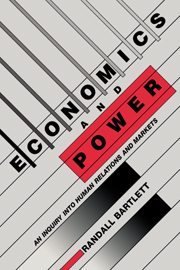Book contents
8 - Rights and power
Published online by Cambridge University Press: 18 September 2009
Summary
In the world of Robinson Crusoe property rights play no role. Property rights are an instrument of society. … An owner of property rights possesses the consent of fellow men to allow him to act in particular ways. An owner expects the community to prevent others from interfering with his actions.
Harold Demsetz, “Toward a Theory of Property Rights”Societies as systems of rights
Markets are always part of a larger social context, entwined in a social system with other endogenous institutions. The sum of these institutions and the self-interested, maximizing individuals who interact within them may, in fact, be much of what constitutes a society. There is at least one thing more. A society is also a system of group defined and defended “rights.” These rights in turn define who may do what, with what, to whom, when, and why. There are several things to note about this definition. The use of the word “may” implies some kind of permission. As every parent knows, things are done without permission, but without an established right there is the expectation of some external punishment. The definition speaks of control over resources, of purpose, and of action. In the language of Chapter 2, it directly implies both event power and agenda power.
- Type
- Chapter
- Information
- Economics and PowerAn Inquiry into Human Relations and Markets, pp. 141 - 166Publisher: Cambridge University PressPrint publication year: 1989



